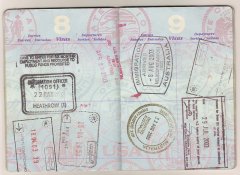By Paige Topper
On December 2, 2015, in the civil case of Diop v. Lynch, a published opinion, the Fourth Circuit denied a petition for review of an Order of the Board of Immigration Appeals because the Immigration Judge appropriately found petitioner, Madiagne Diop, mentally competent to proceed with the removal process.
Diop’s Illegal Immigration Status and Removal Proceedings
Diop was admitted to the United States from his native country, Senegal, as a temporary visitor on October 15, 1997. Although the visa only permitted Diop to stay in the U.S. until April 14, 1998, Diop continued to reside in the U.S. for the past seventeen years.
On January 14, 2012, Diop was arrested after a psychotic episode at his workplace. As a result of his behavior during the arrest, Diop was transferred to the hospital for a psychological evaluation and given antipsychotic medication before returning to police custody. Stemming from the arrest and subsequent convictions, the Department of Homeland Security served Diop with a Notice to Appear. The Notice deemed Diop removable as a nonimmigrant who violated the Immigration and Nationality Act for overstaying his visa.
In the course of the removal proceedings, Diop appeared before an Immigration Judge (IJ) on five separate occasions. On one of these occasions, the IJ questioned Diop on his competency in understanding the proceedings and communicating with an attorney. Diop affirmed that he understood the proceedings and could discuss his Immigration status with his attorney. Ultimately, the IJ granted Diop voluntary departure or, in the alternative, ordered his removal.
Diop filed an appeal to the Board of Immigration Appeals (BIA), claiming that the IJ should have continued the case in order to allow Diop to receive a psychological evaluation. Specifically, Diop argued that a psychological evaluation would have indicated Diop’s mental incompetency and would have resulted in a hold on his removal. The BIA rejected Diop’s argument as he had no prior history of mental health problems and had already demonstrated his ability to communicate with his attorney. Therefore, the BIA affirmed the IJ’s order of removal.
Mental Competency in Removal Proceedings
Diop’s single challenge on appeal was that the IJ should have continued or administratively closed the removal proceeding to permit Diop to receive a mental health evaluation. The Fourth Circuit noted that competency is an issue of fact. Thus, the IJ’s finding of competency was subject to review under the substantial evidence standard and must be treated as conclusive unless the evidence was such that any reasonable judge would have concluded otherwise.
The process for determining mental competency in removal proceedings was established in Matter of M-A-M. The IJ must start with a presumption of competence. If there are indicia of incompetency, then the IJ should consider three factors to determine whether a respondent is competent to participate in the proceedings. The IJ must consider whether the respondent (1) has a rational and factual understanding of the nature and object of the removal proceedings, (2) can consult with an attorney, and (3) has a reasonable opportunity to examine and present evidence and cross-examine witnesses. This process deliberately gives the IJ discretion to determine competency on a case-by-case basis.
Diop Was Competent to Participate in the Proceedings
The Fourth Circuit found that Diop’s appeal failed at the initial stage of the M-A-M analysis because there were no sufficient indicia of Diop’s incompetency. Although Diop brought up the psychotic episode that led to his arrest, the Fourth Circuit noted that past mental history is not dispositive. Furthermore, the Fourth Circuit found that the IJ’s verbal exchange with Diop indicated his competency because Diop voiced no psychological concerns, understood that the proceedings related to his immigration status, and raised only the objection of expense in calling his attorney.
Moreover, the Fourth Circuit emphasized the fact that Diop had five appearances before the IJ and repeatedly asked for continuances as a means to delay his removal. In particular, Diop had previously argued that his psychotic outburst was brought on by lack of sleep to show that his stable and non-violent nature warranted him a continued stay in the U.S. With Diop making such contradictory arguments, the Fourth Circuit concluded that his appeal was yet another delay tactic.
Fourth Circuit Denied the Petition for Review
The Fourth Circuit determined that the IJ’s actions in ascertaining Diop’s competency were in full compliance with M-A-M. Having found that Diop was fully competent to participate in the removal proceedings, the Fourth Circuit denied the petition for review.






